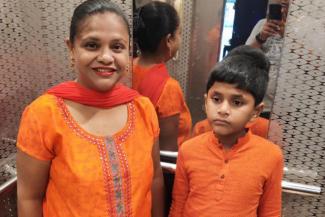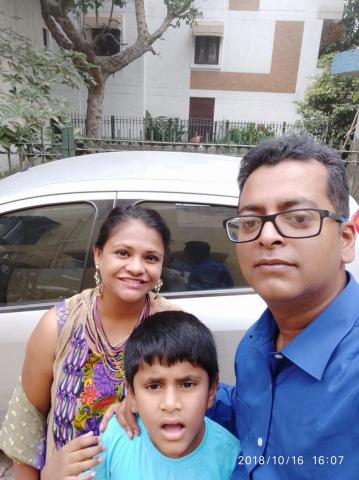
Barnana Chakraborti was a successful professional before she gave it all up to devote full time to her son when he was diagnosed with autism. Her spirit and positivity are indeed something to learn from as she talks about how she overcomes emotional turmoil on a daily basis
When did you first notice signs of autism in your son?
It was just a month before my son was about to turn two that we visited a paediatrician for cold/ cough. As my child was not communicating in the conventional manner on her probing, it raised our suspicions.
What was the reaction to the diagnosis?
The world came crumbling down and we were initially devastated. Then I went into a stage of disbelief, shock, sadness but that lasted only for a few days as I became occupied with continuous therapy. I have been overtly optimistic since the start of our journey and that is what has kept me going.
What made you give up your flourishing career?
Our paediatric neurologist suggested that for the progress of my child it was advisable to give him full support through home programmes which was possible only if I was with him full time.
How difficult was it for you to shift from the role of a professional to a full time caregiver for your son?
Initially all that I could think of was my child’s progress because of which it did not take an effort to shift to the role of a caregiver. I had to make myself ready instantly. Everything was new and I was not even aware of how the role would shape up.
Has it been an arduous journey, being a full time caregiver?
Being a full time caregiver meant taking up multiple roles: –that of a therapist, a mother, a cook, a sports trainer, a special educator and so on. Even if I may not have been directly involved in all roles, at all times getting a perspective and understanding each role was important to monitor and evaluate constant progress of my son. It meant lesser sleep hours and longer working hours. The journey continues.
How do you motivate yourself?
Generally I am an active person. I continue to motivate myself through my activities through what I like most: I am into organising social gatherings, cooking exotic dishes, travelling, writing blogs, working towards inclusion, helping many fellow mothers and I have recently even started my own venture.
How did you try to bring in changes to your caregiving role?
Everything was so sudden after the diagnosis. I only had the option of going by what the doctor/ therapist guided me to. There was really no time left to ponder over things considering the hectic therapy schedule. There was so much I was learning. Our daily cooking became shorter. I used to follow a time table which helped in planning as there were too many things to do.
How do you handle the stress?
Honestly, I try not to allow stress get to me but it is easier said than done. Maybe over the years I am learning not to hit the panic button about everything. I have come to realise that there is only so much we can do and we need to be patient. Some inspiring mothers have motivated me too. I always try to imbibe the best things from each journey.
Do you receive support from other members of the family?
I have an extremely supportive husband. My therapists asked me to get him involved more with my son not necessarily in therapies but parenting, and spending more meaningful time with our son. Today he is a great support in every way. He is a great father and a decent husband I could not have asked for more.

My father has been a great source of inspiration in his own ways and supports me in most of the decisions I take.
Also worth mentioning is support from few other fellow moms.
Have you yourself undergone emotional issues? Did you think of consulting a counsellor for that?
There have been phases of sadness, anxiety, turmoil, uncertainty. I try not to think too deep into those emotions. Yes, I always feel it’s important for me to visit a counsellor as there are times when I still feel like breaking down. I never went to a counsellor though I did speak to other professionals who helped me understand myself better which helps control situations. I learnt that actual strength lies in me, not elsewhere.
5 tips for other caregivers who are also going through a similar turmoil.
- Never give up hope. One gets through the diagnosis.
- Lead a normal life and do not make autism the centre of your life.
- Work hard on your child. Understand the condition. Focus on strengths and hone them.
- Look at your child as any other human being and you will see wonderful things happening.
- Take good care of yourself and seek help as required.






